We flew out from the Cape Verdes on 1st May. It was a pleasant flight & we landed on time & picked up our hire car. It was then a 30 minute drive to our little house in the small town of Villa Franco do Campo.
The house was tiny but very well equipped & in a nice position in the town. After settling in we walked to the harbour & enjoyed a nice meal at a local restaurant. On the way we saw our first birds: Common Woodpigeon; Collared Dove; European Starling; European Blackbird; Eurasian Robin & several Atlantic Canaries.
In the harbour itself, were around 70+ Azorean Yellow-legged Gulls & a couple of Common Terns.
We were up quite late on 2nd May & did some shopping in the town, before driving up into the hills. We were looking for remanent patches of Laurel Forest & when we found some we stopped! After birding for around half an hour we found our target: 3 Azores Bullfinch which gave decent views.
There were plenty of Atlantic Canaries around but none close enough to photograph. Other species included a pair of Common Buzzard; European Blackbird; Eurasian Robin; Blackcap & Chaffinch (looking a bit different from those found on mainland Europe) & a couple of Goldcrest.
It rained most of the night & into the morning, so late getting out on 3rd May. Walked down to the harbour & then along the coast. There was a tiny island offshore with 96 pairs of Common Terns nesting on it. This could be significant as Ebird has the species as uncommon here. A Ruddy Turnstone & a Grey Wagtail were also noted.
In the afternoon we drove to Laguna de Furnas & had a walk around the lake. A Great White Egret & 2 Little Egrets were along the waters edge. I believe both are rarities here.
We had close views of the local Chaffinch as well as other common species like Blackbird & Robin. A Greenfinch flew high overhead calling. The weather took a turn for the worse, so we headed back home.
It rained most of the morning on the 4th May, so we decided to stay home & pack ready for our flight to Pico in the afternoon.
It was still raining on 5th May so we stayed in bed for a while! Then after a big shop to get in the groceries we arrived back home & spent late afternoon overlooking the sea & it turned out to be quite productive: 720+ Cory's Shearwater sat on the sea (presumably they are breeding here on Pico)? Sooty Shearwater & a Common Tern.
Atlantic Canaries kept flying over the garden calling loudly. It was a very pleasant afternoon/evening.
The 6th May was all about the pomp & pageantry of the coronation of King Charles III, which we watched on TV.
7th May was a bit of a washout all day! Persistent rain & low cloud meant we couldn't see very much at all! We drove up in the hills to a lake, but the bad weather stopped us seeing much. We then drove to the coast at Laejes but heavy rain meant we visited a local pub! Went back home to the apartment early.
The 8th May was our Whale Watching trip out of Laejes. It proved to be quite an exciting afternoon! The weather was again quite poor: medium to heavy rain, overcast skies & windy. Just before boarding the rib, the rain stopped, but the swell was quite large, which meant for an exciting ride out to sea.
We passed quite a few Cory's Shearwater, some of which came to almost touching distance of the boat. However, in these conditions they were difficult to photograph.
Then we came across a Sperm Whale at the surface & we watched it on & off (mainly off) for around fifteen minutes before it dived. Based on size probably an adult female & certainly the closest I have ever been to a Sperm Whale. All my previous sightings have been distant from a large ship. Then we moved to another area where another Sperm Whale had been spotted. We saw it but briefly as it soon dived. On the way we spotted a Barolo Shearwater but the captain wouldn't stop or even slow down, for me to obtain photos. We were the only birders on board, which meant whales were top priority!
Later we spotted a group of at least 12-15 Short-beaked Common Dolphins which came all around our boat. They were so fast in the large swell being almost impossible to photograph. Then I spotted a Monteiro's Storm Petrel but it quickly went away from the boat.
On the way back we came through a large raft of Cory's Shearwaters which gave us tremendous close views.
It had been an excellent afternoon out on the sea but heavy swells & choppy seas made for an uncomfortable ride. Delana felt ill for most of the trip which stopped her enjoyment. The rib is very low to the water, which means one cannot see that far & birds in particular come to you very quickly & then just as quickly vanish behind a wave. If this had been a birding trip with chum, then this boat would have been excellent for the job, but we hardly stopped, moving from one place to another in search of whales. It made for almost impossible photography & I had to keep the camera in its waterproof bag for much of the trip because of spray. Mind you two new birds in an afternoon can't be bad!
We had high hopes for our last day on Pico on 9th May. We were up & the weather was calm with the best visibility we have seen. However, as we were getting ready the rain rolled in & became heavy throughout the entire morning, keeping us house bound. Very frustrating. We did manage to visit the coast in the late afternoon though.
We managed to drive down to the coast early evening & despite the constant drizzle it was a pleasant walk. Best birds were Common Terns nesting on the lava cliffs & plenty of Atlantic Canaries.
As soon as it got properly dark, the calls of the Cory's Shearwaters started! It is a weird sound & it goes on for a long time. Some birds were flying overhead inland, while others were calling from holes in the fields in the front of where we were staying. It was a strange & wonderful experience which was new for me.
Then it was time to pack & we left for Sao Jorge early morning on 10th May. Even though our stay on this island has been pleasant, we failed to make the most of our time here, because of the constant rain & low cloud, which made exploring the uplands impossible.
It was a stormy & rain lashed night. Dawn saw it still raining hard, but it gradually ceased. We drove to the port & dropped off the car & onto the ferry. It took us one & half hours to cross the sea to Sao Jorge & although the weather threatened to turn bad, it never actually did.
Cory's Shearwaters were everywhere & at least 260 birds were noted. We also saw the odd Yellow-legged Gull & Common Tern, but that was it. Nothing rare seen at all.
We picked up our hire car & drove to Intact Farm. Our cabin was in a secluded location overlooking the sea & there was an excellent walking/cycling track running along the coastline, which we used to walk to the restaurant in the evening. Cory's Shearwaters started massing in flocks on the sea from late afternoon & the farm owner said good numbers breed on his farm.
On the 11th May we drove to Faja dos Cubres, which is one of the very few water bodies on this island. The scenery was amazing! Not seen anything quite like this before. We enjoyed a nice walk around the wetland, but large parts were out of bounds because of on-going work on a small bridge. Common Moorhen was the highlight! However, we did see lots of Grey Wagtails & Blackcaps out in the open often feeding on top of the rocky walls.
We also saw lots of Madeiran Wall Lizards, which seemed to be everywhere. After a long lunch we came back to our cabin & then walked along the coast enjoying the spectacular scenery.
12th May saw us driving to the very eastern most point of the island at Topo. There is a viewpoint which overlooks an island where around 200 pairs of Yellow-legged Gull were nesting. We saw a migrant Whimbrel on the rocks below the viewpoint. It was a very scenic spot & a nice outing. We drove back to our cabin & had a Zoom meeting with Aneka (Delana's sister) on the occasion of her 70 th. birthday.
The 13th May is Global Birding Big Day! Delana & I enjoyed a lazy morning around the cabin & set out late morning for the highest point on the island & we were rewarded with lovely country lanes & great views of the landscape far below.
We then drove to Point Rosais & had a walk around this peninsula. Far out to sea were a group of Dolphins (presumably Common Dolphins) who had corralled a huge shoal of fish into a tight bunch on which they & around 800+ Cory's Shearwaters were feeding. Later we saw 5 Risso's Dolphins of which two animals were very white (almost albino) they were mating close inshore but I didn't have my camera with me!
Then we drove back to the cabin, enjoying the afternoon, before going to the pub/restaurant again for good food & live music. There was a huge flock of around 900 Cory's Shearwaters sat on the sea.
We spent our final day around the cabin, doing computer work & generally relaxing. Sao Jorge is a beautiful island & we have enjoyed our time here. Tomorrow we fly to Lisbon to meet up with Graham for the next leg of our trip.





















































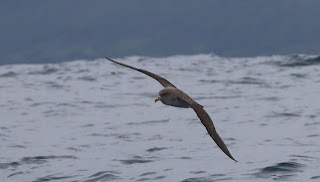





















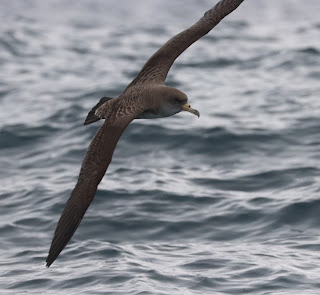
















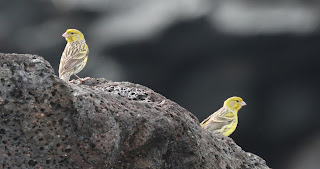



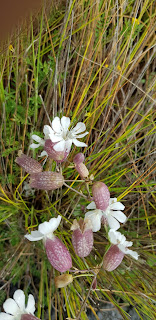





















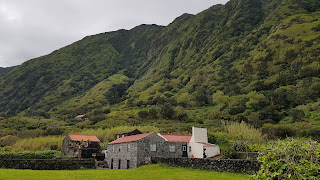





















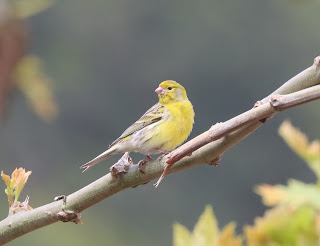


No comments:
Post a Comment